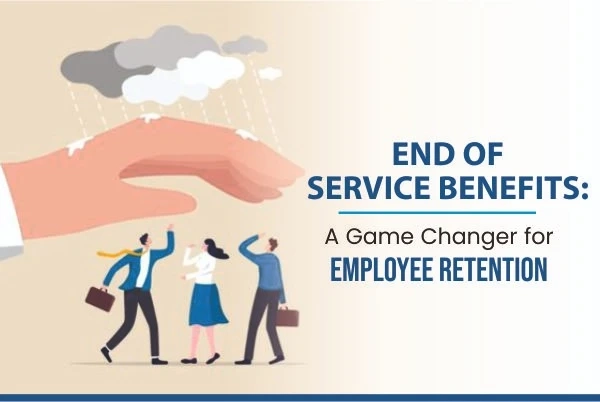The end of service benefit (EOSB) is an essential financial entitlement for employees in the UAE, ensuring they receive a lump sum payment at the end of their tenure with an employer. Whether you are an expatriate or a local employee, understanding your rights under the end of service benefit in UAE can help you plan your financial future effectively.
In this comprehensive guide, we will explore what the end of service benefit is, who is eligible, how it is calculated, and recent updates in UAE labor laws affecting gratuity payments.
What is End of Service Benefit (EOSB)?
The end of service benefit is a statutory financial compensation that an employer must pay to an employee upon termination of their contract, provided they have completed a minimum period of service. It acts as a form of retirement or severance pay, ensuring financial security for employees after leaving their job.
The UAE Labor Law governs EOSB, ensuring fair compensation for employees who have worked for a company for at least one year.
Who is Eligible for End of Service Benefit in UAE?
Employees working in the UAE under the private sector, government sector, or free zones are eligible for EOSB, provided they meet the following criteria:
- Must have worked for at least one year continuously.
- Employment should be under a limited or unlimited contract (with some differences in calculation).
- Should not have been dismissed for gross misconduct, as per Article 120 of the UAE Labor Law.
- Must not have resigned before completing one year of service.
For employees who resign before completing five years, gratuity calculation differs from those who complete the full five-year tenure.
How is End of Service Benefit Calculated?
1. For Limited Contracts
A limited contract is an employment agreement with a fixed end date. The EOSB calculation depends on the length of service:
- Less than 1 year: No gratuity entitlement.
- 1 to 5 years of service: 21 days of basic salary per year.
- More than 5 years of service: 21 days of basic salary for the first five years, plus 30 days of basic salary per year for any additional years.
Example: If an employee with a basic salary of AED 10,000 works for 6 years, their EOSB calculation will be:
(21×10,000×5)/30+(30×10,000×1)/30(21 \times 10,000 \times 5) / 30 + (30 \times 10,000 \times 1) / 30(21×10,000×5)/30+(30×10,000×1)/30
Total EOSB = AED 58,333
2. For Unlimited Contracts
An unlimited contract has no specific end date and can be terminated by either party with notice. The EOSB calculation is:
- Less than 1 year: No gratuity entitlement.
- 1 to 3 years: 1/3rd of the total gratuity (21 days per year).
- 3 to 5 years: 2/3rd of the total gratuity (21 days per year).
- More than 5 years: Full gratuity (21 days per year for the first 5 years, then 30 days per year).
For example, if an employee with a basic salary of AED 8,000 resigns after 4 years, their EOSB would be:
(21×8,000×4)/30×23(21 \times 8,000 \times 4) / 30 \times \frac{2}{3}(21×8,000×4)/30×32
Total EOSB = AED 22,400
Recent Updates on End of Service Benefit in UAE
1. New Gratuity Scheme (2023-2024)
In February 2023, the UAE government introduced a voluntary savings investment scheme for private-sector and free-zone employees. This allows employees to invest their end of service benefits into investment funds for long-term financial security.
2. Change in Gratuity for Resigned Employees
Previously, employees resigning before five years received a reduced gratuity. However, under new reforms, full gratuity may be applicable in some cases, benefiting employees who leave jobs after a few years.
3. More Transparent EOSB Calculations
Employers are now required to clearly state gratuity payments in employment contracts and provide employees with periodic statements.
Common Questions About EOSB in UAE
1. Can an Employer Deduct EOSB for Any Reason?
Employers cannot withhold or deduct gratuity unless an employee is terminated for gross misconduct or has outstanding debts to the company.
2. Is EOSB Paid Along With the Last Salary?
Yes, EOSB should be settled within 14 days of the employee’s final working day.
3. Does EOSB Include Bonuses and Allowances?
No, EOSB is calculated only on the basic salary, excluding bonuses, commissions, or housing allowances.
4. Can an Employee Claim EOSB If They Resign?
Yes, but the amount depends on the duration of service and whether the contract is limited or unlimited.
5. Is Gratuity Affected by Unpaid Leaves?
Unpaid leave is usually not counted in EOSB calculations, as gratuity is based on continuous service.
How to Check Your EOSB Online?
Many companies now provide EOSB calculations in salary slips or HR portals. Additionally, you can use:
- The UAE Ministry of Human Resources & Emiratisation (MOHRE) portal
- Company HR departments
- EOSB calculators available on financial websites
For professional assistance, you can consult Mithras Consultants for expert guidance on end of service benefit in UAE.
How to Ensure You Receive Your Full End of Service Benefit?
- Understand Your Contract – Ensure you know whether you are on a limited or unlimited contract, as gratuity rules vary.
- Keep Salary Records – Maintain records of your basic salary, as EOSB is calculated based on it.
- Check Your Final Settlement – Carefully review your gratuity amount and ensure correct calculations.
- Seek Legal Advice if Needed – If your employer delays or refuses payment, you can file a complaint with MOHRE.
Conclusion
The end of service benefit in UAE is a crucial financial entitlement for employees, ensuring they receive fair compensation after completing their tenure. Understanding how EOSB is calculated for limited and unlimited contracts, recent UAE labor law updates, and legal rights can help employees maximize their benefits.
For expert advice on EOSB calculations, compliance, and legal assistance, visit Mithras Consultants and secure your financial future today!



